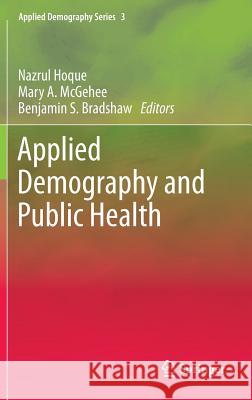Applied Demography and Public Health » książka



Applied Demography and Public Health
ISBN-13: 9789400761391 / Angielski / Twarda / 2013 / 391 str.
Applied Demography and Public Health
ISBN-13: 9789400761391 / Angielski / Twarda / 2013 / 391 str.
(netto: 383,36 VAT: 5%)
Najniższa cena z 30 dni: 385,52
ok. 16-18 dni roboczych.
Darmowa dostawa!
This book shows how applied demographic methods can help address public health issues, with examples from measuring the impact of aging on health care and health costs to cause-specific mortality and maternal health and more. Offers many resources and tools.
I highly recommend this text to academics and practitioners in both demography and public health. Its breadth and depth make it an excellent choice as a companion text in either demography or public health courses.
Steve Murdock, Ph.D.
Professor of Sociology
Rice University
Applied Demography and Public Health brings together important topical subjects and useful findings and materials in a single source. The coverage of methodological issues and findings are of high interest to applied demographers and health practitioners. Be prepared to take notes to keep track of the ideas you get while reading this wonderful book.
David A. Swanson, Ph.D.
Professor of Sociology
University of California Riverside
Riverside, California 92521 USA
Acknowledgements.- INTRODUCTION.- Chapter 1: Introduction: Nazrul Hoque, Mary A. McGehee, and Benjamin S. Bradshaw.- SECTION I: IMPACT OF AGING ON HEALTH AND HEALTH-RELATED EXPENDITURE.- Chapter 2: The Implications of Aging and Diversification of Population on Overweight and Obesity and the Cost Associated with Overweight and Obesity in Texas, 2000-2040: Nazrul Hoque and Jeffrey Howard.- Chapter 3: The Effect of Obesity on Intergenerational Income Mobility: Liana Fox and Nathan Hutto.- Chapter 4: A Cross-Country Comparison of Sociodemographic Correlates of Depression in the WHO Study of Global Aging and Adult Health (SAGE): Tristan Gorrindo, Somnath Chatterji, Paul Kowal, Zachary Epstein, and Maxine Weinstein.- Chapter 5: Population Aging and Health Expenditure in Kerala: An Empirical Analysis: Yadawendra Singh.- SECTION II: CAUSE-SPECIFIC MORTALITY.- Chapter 6: State Estimates of Cause and Condition-Specific Mortality Rates for Diabetes Mellitus: David W. Smith, Stephanie L. McFall, and Benjamin S. Bradshaw.- Chapter 7: Individual- and County-Level Factors Associated with Racial Disparities in Cause-Specific Infant Mortality: Florida 1980-2000: Jessica C. Bishop-Royse and Isaac W. Eberstein.- Chapter 8: Estimates of Survival and Mortality from Successive Cross-Sectional Surveys: David W. Smith, Stephanie L. McFall, and Benjamin Bradshaw.- Chapter 9: Cancer Screening in the U.S. and Europe: Policies, Practice, and Trends in Cancer Incidence and Mortality: Krista Garcia and Eileen M. Crimmins.- SECTION III: MATERNAL HEALTH AND MORBIDITY.- Chapter 10: Obstetric Morbidity among Currently Married Women in India: A Serious Reproductive Health Concern: Pandurang Sontakke and R. S. Reshmi.- Chapter 11: Maternal Health Status and Early Childbearing: A Test of the Weathering Hypothesis: Sarah O. Meadows, Megan K. Beckett, Marc N. Elliot, and Christine Petersen.- Chapter 12: Maternal Health and Maternal Mortality in Post War Liberia: A Survey Analysis: Komandduri S. Murty and Jimmy D. McCamey Jr..- SECTION IV: SPECIAL ANALYSIS.- Chapter 13: Neighborhood Resources and Adolescent Health and Risk Behaviors: Karen A. Snedker, Jerald R. Herting, and Emily Walton.- Chapter 14: Population Density, Density of Alcohol Retail Outlets, and Point of Consumption’s Relation to Violent and Non-Violent Crime: A Spatial Analysis: E. B. Mancha and M. Zey: Chapter 15: Determinants of Blood Pressure Control in Hypertensive Diabetic Patients in Rajshahi District of Bangladesh: Md. Nazrul Islam Mondal, Nazrul Hoque, Sabiha Yasmin Moni, and Md. Rocky Khan Chowdhury.- Chapter 16: Active Aging Index and Healthy Life Expectancy in Rajshahi District of Bangladesh: Md. Ismail Tareque, Nazrul Hoque, Towfiqua Mahfuza Islam, Kazuo Kawahara, and Makiko Sugawa.- Chapter 17: A Systematic Review of Retirement as a Risk Factor for Mortality: Matthew J. Shim, David Gimeno, Sandi L. Pruitt, Christopher B. McLeod, Margaret J. Foster, and Benjamin C. Amick III.- SECTION V: METHODOLOGICAL ISSUES.- Chapter 18: Back to Basics or into a Brave New World? The Potential and Pitfalls of Biomarkers in Explaining the Pathways between Social Engagement and Health: Yumiko Kamiya, Virpi Timonen, Roman Romero-Ortuno, and RoseAnne Kenny.- Chapter 19: Methodological Aspects of Studying Human Aging, Health, and Mortality: A. I. Yashin, I. Akushevich, K. Arbeev, A. Kulminski, and S. Ukraintseva.- Chapter 20: Understanding Society – The UK Household Longitudinal Survey: A Resource for Demographers: Stephanie L. McFall and Nick Buck.- Chapter 21: The Applicability of the Lee-Carter Method to Forecast Health Services Use in Brazil: Cristina Guimarães Rodrigues, Mônica Viegas Andrade, Bernardo Lanza Queiroz, and Carla Jorge Machado.
This book combines the disciplines of applied demography and public health by describing how applied demographic techniques can be used to help address public health issues. Besides addressing the impact of aging on health and health-related expenditure, cause-specific mortality, and maternal health and morbidity, the book provides several chapters on special analysis and methodological issues.
The chapters provide a number of resources and tools that can be used in conducting research aimed at promoting public health. These resources include information on a variety of health research datasets, different statistical methodologies for analyzing health-related data and developing concepts related to health status, methodologies for forecasting or projecting disease incidences and associated costs, and discussions of demographic concepts used to measure population health status.
1997-2026 DolnySlask.com Agencja Internetowa
KrainaKsiazek.PL - Księgarnia Internetowa









